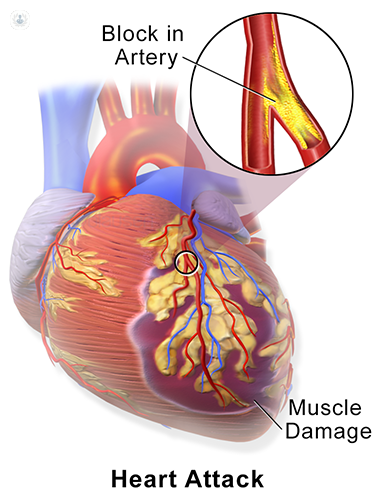


What is a heart attack?
A heart attack (myocardial infarction) occurs when a coronary artery becomes obstructed, thus obstructing the flow of blood to the heart. A heart attack is a medical emergency and if it is suspected call an ambulance. If blood supply is prolonged, permanent damage could result which is life-threatening. If someone has had a heart attack, they will be conscious. Cardiac arrest, on the other hand, is when the heart stops pumping blood around the body, causing breathing to stop. If someone has had cardiac arrest, they will be unconscious and need CPR immediately.

What are the warning signs and symptoms of a heart attack?
Some heart attacks will be preceded by certain warning signs, whilst others will show no signs. Some warning signs include:
- Chest pain
- Difficulty breathing
- Sweating
- Nausea or dizziness
- Fatigue
- Pain that spreads to the left or right arm
What causes a heart attack?
A heart attack occurs when a coronary artery becomes blocked. This often results from the build-up of fatty deposits called atheroma.
The main risk factors of heart attacks are the following:
- Arterial hypertension
- Atherosclerosis (coronary artery disease)
- Smoking
- Stress
- Sedentary lifestyle
- Obesity
- Diabetes
Can a heart attack be prevented?
The best way to avoid having a heart attack is to avoid developing coronary heart disease. This can be done by living a healthy lifestyle, and avoiding the following:
- Smoking
- Being overweight
- Poorly managed diabetes
- High cholesterol
- High blood pressure
- Being sedentary
It is important to carry out clinical and / or cardiological checks periodically, especially if you are over the age of 40 and having a family history or heart disease. This may involve having tests, such as an echocardiogram and an electrocardiogram. These studies allow us to know if the patient is within the risk parameters. If you are within these risk parameters, it is recommended that you make certain lifestyle changes.
What is the treatment for heart attacks?
Following a heart attack, medications and surgery will be recommended to prevent future heart attacks.
Medications include:
- Aspirin or other blood-thinning medications
- Thrombolytic medications
- Beta-blockers
- Anticoagulants
- Blood pressure medication
Surgery may involve angioplasty or stenting to find blockages and to remove them. A stent may be inserted to keep certain arteries open. Coronary bypass surgery may also be needed, especially in an emergency, to get blood flowing back to the heart. This involves rerouting blood around the blocked artery back to the heart. Valve replacement may also be required if they are not functioning correctly. In the most severe of cases, a heart replacement will be performed.